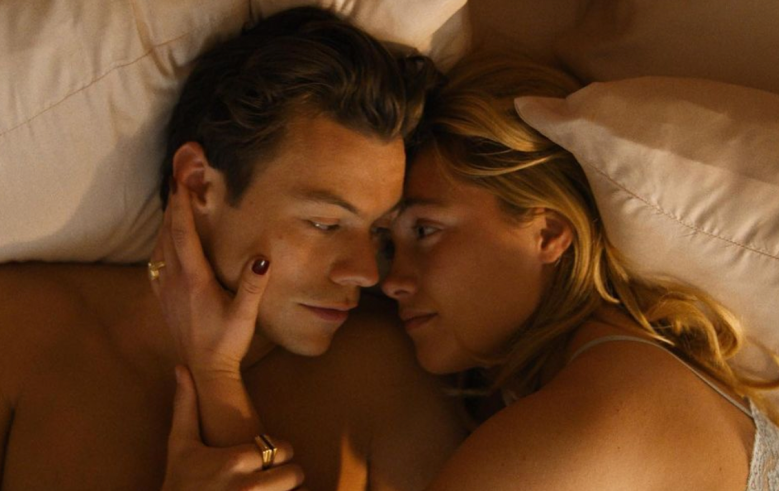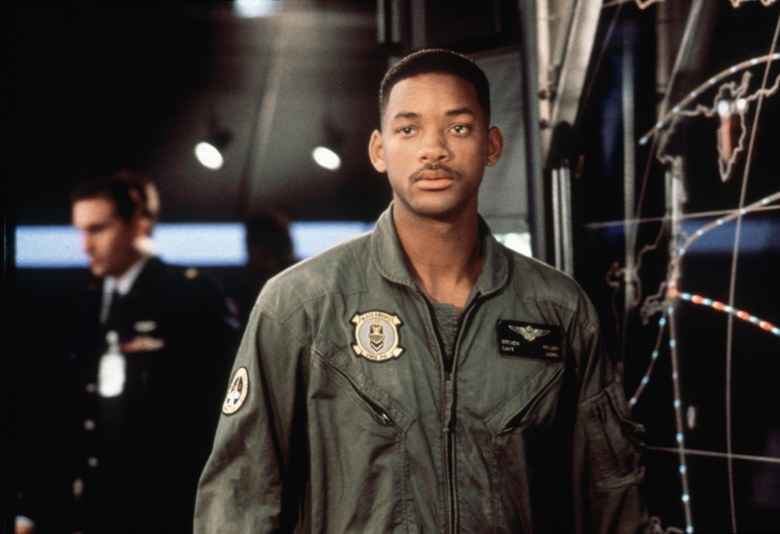This weekend, Harry Styles will participate in a long and storied Hollywood tradition that includes Frank Sinatra in “Higher and Higher,” Elvis Presley in “Love Me Tender,” Madonna in “Desperately Seeking Susan,” Cher in “Come Back to the 5 & Dime Jimmy Dean, Jimmy Dean” and Sting in “Quadrophenia.” Each was an established pop-music icon who began a film career with a comparatively humble role.
It’s one context among the many for anticipating this weekend’s performance of “Don’t Worry Darling” (Warner Bros.). Olivia Wilde’s second feature (after her well-received “Booksmart”) is an original R-rated thriller starring Styles and Florence Pugh as a married couple in strange circumstances. Like last week’s “The Woman King” (Sony), it is a mid-budget original story with a female director with the chance to reassert the value of non-franchise films.
Here, Styles was a late replacement for Shia LaBeouf and this wasn’t his film debut; he received fourth billing in Christopher Nolan’s ensemble drama “Dunkirk.” No matter; he received huge media attention long before the “Darling” premiere. (He avoided most controversy related to it until the imbroglio about whether he spat on co-star Chris Pine at the Venice Film Festival screening, a claim denied by Pine’s reps).

“Don’t Worry Darling”
Warner Bros.
Spitgate was only one of the film’s many would-be scandals. We won’t recount them here beyond addressing concern that they might hurt performance; advance projections suggest that’s not the case. The current estimated opening weekend gross is over $20 million, with an uncertain amount already banked from sold-out Monday night special IMAX shows that included a panel with Wilde, Styles, and much of the cast (sans Pugh and Pine). The film’s reported budget is something under $35 million.
The reality is that ever since Wilde was surprised by a custody case process server at CinemaCon last April, her original film has earned a universal awareness that blockbusters take for granted. Despite the likely stress for all concerned (and certainly for any associated publicists), there was, as they say, no bad publicity.
The brouhaha as the film neared release is atypical from what past idols’ releases would have been in times with less immediate social media focus on the latest gossip. But it many other ways, it follows past patterns.
Styles, like many singers, shied away from his day job in seeking acting credibility. (Significant exceptions: Barbra Streisand in “Funny Girl,” Whitney Houston in “The Bodyguard,” and Diana Ross in “Lady Sings the Blues.”) Instead, he surrounded himself with established actors and accepted fourth billing.
It was good enough for Elvis Presley, whose manager Colonel Tom Parker set him up with MGM for his debut, “Love Me Tender.” It was a supporting role in a post-Civil War family drama, a role rejected as too small by Jeffrey Hunter and Robert Wagner. Billed behind Richard Egan and Debra Paget, the producers added four songs (including “Love Me Tender,” which was not the original title) and it became the studio’s widest release at that point. Elvis never took second billing again — not even for Streisand, when she tried to get him for her 1976 “A Star Is Born.”
Elvis sparked an era where many teen idols crossed over to movies including Ricky Nelson (“Rio Bravo”), Fabian (“Hound-Dog Man”), Frankie Avalon (“Beach Blanket Bingo”), and even Pat Boone (“Journey to the Center of the Earth”). Among established performers, Harry Belafonte had significant roles in “Island in the Sun” and “Odds Against Tomorrow.” Post-Jerry Lewis, Dean Martin became — like his pal Sinatra — a major movie star while at the peak of his singing career.

“Independence Day”
20th Century Fox/Kobal/Shutterstock
Will Smith is an extreme case where his start as a singer was all but forgotten as his acting career prospered. He also went the supporting-role route (starting with the polar opposite of “Fresh Prince of Bel-Air” as a homeless double amputee in “Where the Day Takes You”). Three years later, “Bad Boys” turned him into one of Hollywood’s biggest stars for a quarter century.
The M.O. is almost always the same: Start small, be a part of an ensemble, surround yourself with talent, don’t play yourself, and don’t be a gimmick. That’s Styles’ model as well. Next is “My Policeman,” a six-actor ensemble adaptation of Bethan Roberts’ 2012 novel. The Amazon production will make its theatrical debut October 21, followed by a streaming release November 4. He and his castmates won the Best Acting prize from the Toronto International Film Festival’s Tribute Awards, the first time that the award was presented to an ensemble rather than an individual.
It’s one context among the many for anticipating this weekend’s performance of “Don’t Worry Darling” (Warner Bros.). Olivia Wilde’s second feature (after her well-received “Booksmart”) is an original R-rated thriller starring Styles and Florence Pugh as a married couple in strange circumstances. Like last week’s “The Woman King” (Sony), it is a mid-budget original story with a female director with the chance to reassert the value of non-franchise films.
Here, Styles was a late replacement for Shia LaBeouf and this wasn’t his film debut; he received fourth billing in Christopher Nolan’s ensemble drama “Dunkirk.” No matter; he received huge media attention long before the “Darling” premiere. (He avoided most controversy related to it until the imbroglio about whether he spat on co-star Chris Pine at the Venice Film Festival screening, a claim denied by Pine’s reps).

“Don’t Worry Darling”
Warner Bros.
Spitgate was only one of the film’s many would-be scandals. We won’t recount them here beyond addressing concern that they might hurt performance; advance projections suggest that’s not the case. The current estimated opening weekend gross is over $20 million, with an uncertain amount already banked from sold-out Monday night special IMAX shows that included a panel with Wilde, Styles, and much of the cast (sans Pugh and Pine). The film’s reported budget is something under $35 million.
The reality is that ever since Wilde was surprised by a custody case process server at CinemaCon last April, her original film has earned a universal awareness that blockbusters take for granted. Despite the likely stress for all concerned (and certainly for any associated publicists), there was, as they say, no bad publicity.
The brouhaha as the film neared release is atypical from what past idols’ releases would have been in times with less immediate social media focus on the latest gossip. But it many other ways, it follows past patterns.
Styles, like many singers, shied away from his day job in seeking acting credibility. (Significant exceptions: Barbra Streisand in “Funny Girl,” Whitney Houston in “The Bodyguard,” and Diana Ross in “Lady Sings the Blues.”) Instead, he surrounded himself with established actors and accepted fourth billing.
It was good enough for Elvis Presley, whose manager Colonel Tom Parker set him up with MGM for his debut, “Love Me Tender.” It was a supporting role in a post-Civil War family drama, a role rejected as too small by Jeffrey Hunter and Robert Wagner. Billed behind Richard Egan and Debra Paget, the producers added four songs (including “Love Me Tender,” which was not the original title) and it became the studio’s widest release at that point. Elvis never took second billing again — not even for Streisand, when she tried to get him for her 1976 “A Star Is Born.”
Elvis sparked an era where many teen idols crossed over to movies including Ricky Nelson (“Rio Bravo”), Fabian (“Hound-Dog Man”), Frankie Avalon (“Beach Blanket Bingo”), and even Pat Boone (“Journey to the Center of the Earth”). Among established performers, Harry Belafonte had significant roles in “Island in the Sun” and “Odds Against Tomorrow.” Post-Jerry Lewis, Dean Martin became — like his pal Sinatra — a major movie star while at the peak of his singing career.

“Independence Day”
20th Century Fox/Kobal/Shutterstock
Will Smith is an extreme case where his start as a singer was all but forgotten as his acting career prospered. He also went the supporting-role route (starting with the polar opposite of “Fresh Prince of Bel-Air” as a homeless double amputee in “Where the Day Takes You”). Three years later, “Bad Boys” turned him into one of Hollywood’s biggest stars for a quarter century.
The M.O. is almost always the same: Start small, be a part of an ensemble, surround yourself with talent, don’t play yourself, and don’t be a gimmick. That’s Styles’ model as well. Next is “My Policeman,” a six-actor ensemble adaptation of Bethan Roberts’ 2012 novel. The Amazon production will make its theatrical debut October 21, followed by a streaming release November 4. He and his castmates won the Best Acting prize from the Toronto International Film Festival’s Tribute Awards, the first time that the award was presented to an ensemble rather than an individual.


